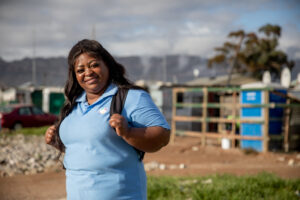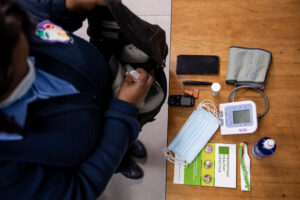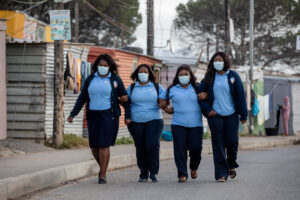World AIDS Day: What Will It Take To End AIDS By 2030?

Nozethu, m2m Client, in her home in Lwandle, South Africa.
“I have been living with HIV since 2020. As if this was not enough, I was also diagnosed with two more chronic illnesses—hypertension and diabetes—in March 2022. Learning that I had diabetes and hypertension was extremely hard, as I was still in the process of accepting my HIV status.” – Nozethu, a mother of three from Lwandle, South Africa, and a mothers2mothers (m2m) client since 2020.
World AIDS Day
On the 1st of December, the global health community marks World AIDS Day. Over the past year, progress in the fight against the HIV/AIDS pandemic is stalling. Globally, in 2021, 650,000 people were lost to AIDS and 1.5 million people newly acquired HIV—860,000 of whom live in sub-Saharan Africa. What is more, growing inequities and increasingly complex health challenges—especially in sub-Saharan Africa—stand between the world and the United Nations’ Sustainable Development Goal to end HIV/AIDS by 2030.
So, what will it take to truly end AIDS?
For m2m, the key lies in equity and innovation. Equity in access to health care, access to education, access to treatment; allied with innovation to find new ways to respond to related health needs so that people living with HIV can lead healthy, thriving lives.

m2m Mentor Mothers walking in the community they serve outside of Strand, South Africa.
This matters because in many of the communities we work in across sub-Saharan Africa, HIV is rarely the only health challenge that our clients are, or will be, confronted with. For example, the likelihood of a person developing tuberculosis or suffering from a malaria infection increases significantly if they are living with HIV. Non-communicable diseases (NCDs), such as diabetes, cardiovascular diseases, and cervical cancer, are a large and growing health threat, and HIV infection may increase the risk of certain NCDs—around two thirds of people living with non-communicable diseases across the African continent die prematurely, the majority of whom are living with HIV.
For many, this is further compounded by the fact that they might live in poor and marginalised settings. In Lwandle for example, where Nozethu lives, many of her peers are unemployed and can’t afford the right diet—some struggle to afford food at all.
The solution?

Millicent, m2m Spokeswoman and Community Health Worker in Strand, South Africa.
The key to ending HIV/AIDS by 2030 is responding better to the changing health needs of women, children, adolescents and families. This means taking a person-centred, integrated approach—re-imagining the range of services needed, and how they are delivered, to not only bridge inequities and prevent new infections, but also ensure that people living with HIV are healthy and thriving and can access the care they need and deserve to manage their health in a holistic way. In this way, we can ensure more people get the care they need, and that they are more likely to stay in care for the long run.
Community Health Workers, like Millicent Magwa, an m2m Mentor Mother working in Strand, South Africa, show every day that not only is this possible—it is having a tangible and long-lasting impact on the future and well-being of their communities.

An m2m Mentor Mother packing her kit bag in Ikhwezi Clinic.
In Millicent’s own words: “We know that if we are going to end AIDS, we can’t just focus on one issue. Instead, we see our clients as individuals first, and help them with their related health needs. That is why, at Ikhwezi clinic, where I am based, we have been innovating and expanding our services beyond HIV.
Each day, I pack a little black kit bag that contains a blood sugar monitor, a blood pressure monitor, a scale, and my measuring tape. I go door-to-door, providing HIV-related services, while also using these tools to conduct broader health screenings that people might have to wait hours for at a clinic…if they go at all. I help those living with non-communicable diseases to manage their conditions. And, when I identify a client with high blood pressure, diabetes, or malnutrition for the first time, I connect them with clinic-based Mentor Mothers who ensure that they get the services they need.”
Receiving this support from someone she trusts has really made a difference for Nozethu, supporting her to take control of her health: “Any time I have questions about my chronic conditions, I simply walk to the Mentor Mothers in the clinic, even if it’s not my appointment day. Thanks to the education and support I receive from them, I have learned how to adjust and maintain a healthy lifestyle with my family, and they have encouraged me to take my medication consistently. The Mentor Mothers were with me when I was first diagnosed with HIV in 2020, and they are with me today as I learn to live with two more chronic illnesses.”
The added benefit of this approach is that it helps us to reach more people—Millicent explains: “Our core clients are still women, children, and adolescents, but while I am in their home I can also screen and support other family members. By providing a “one-stop shop” where people can go for information and screening on a range of health issues that might affect them and their family, it makes it more likely that they will start and stay on treatment, whether for HIV or other conditions.”
Join us this World AIDS Day

Millicent and her colleagues in Nomzmo, South Africa.
As we reflect this World AIDS Day on what it will take to truly end HIV/AIDS by 2030, we are reminded of Millicent’s powerful message: “For me it means seeing the person not the status, understanding the bigger picture of their health and lifestyle challenges beyond HIV, and delivering care that meets them where they are, to make it easy for them to get the services they need.
That’s why our work at mothers2mothers is so important. We come from the community, so we understand the challenges that people face, the inequities that exist, and we know how to overcome them…because we did this ourselves!”
This World AIDS Day, if you too were inspired by Millicent’s and her fellow m2m Mentor Mothers’ tireless dedication to the health and well-being of their peers, the way they support their peers to overcome the inequities they face, and their willingness to be part of innovative ways of meeting people’s broader health needs beyond HIV—please consider supporting mothers2mothers and making a donation to our work.






















